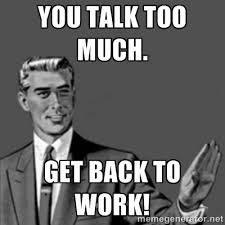You walk into your office on a Monday morning and are instantly overwhelmed with the amount of work you have that week.
Just as you’ve figured out how to cram all your meetings and projects into your schedule, you look up from your desk and are instantly full of dread. Your chatty coworker is headed right toward you and has chosen you as his next victim. Well, there goes the better part of the morning.

Of course, having a great social relationship can boost company culture. Once in a while, some water cooler talk can be a nice break from your hard work, but some people take this way too far.
Some will come by your desk every few hours, and even remote workers might incessantly ping you on Slack. According to a survey conducted by talent mobility company Lee Hecht Harrison, talkative coworkers are the #1 disruption at work.
Even though having a chatty worker in your office is different than difficult coworkers, you must know how to deal with them.
Here are the different kinds of chatty coworkers, and how to keep them from disrupting your day.








